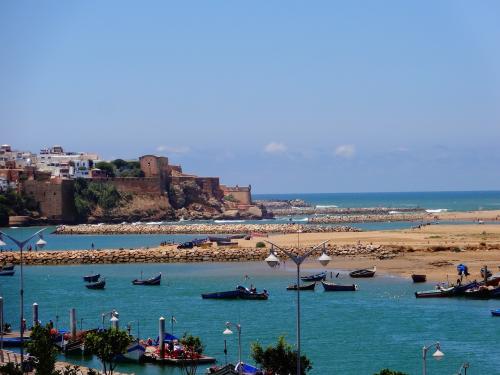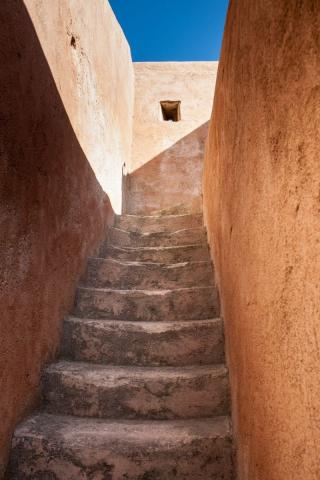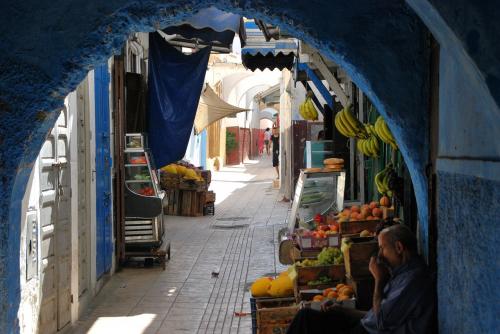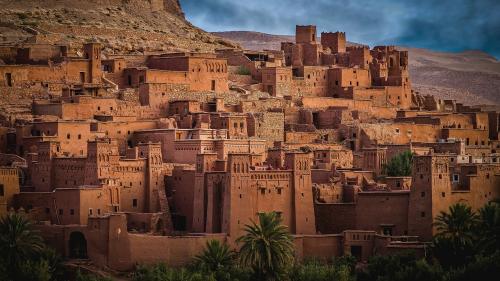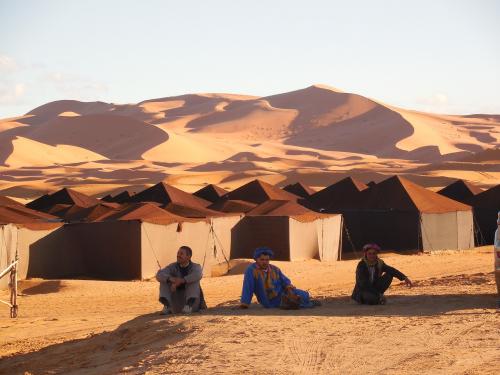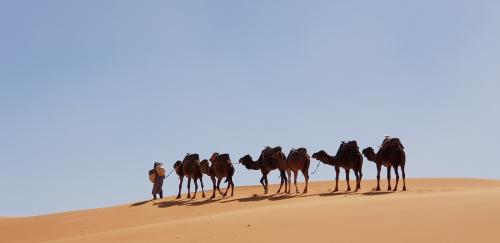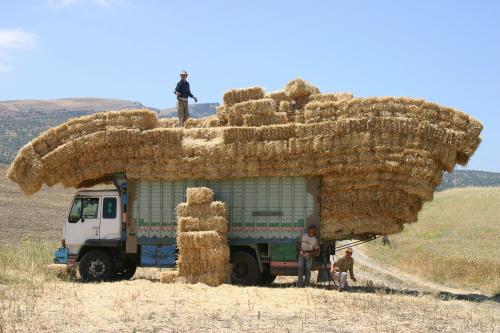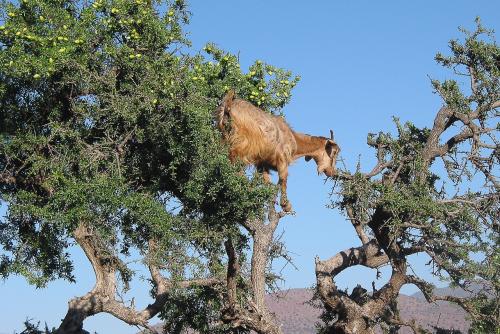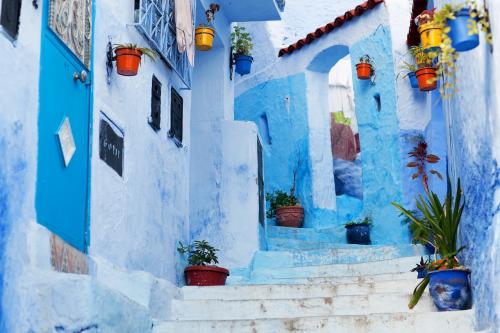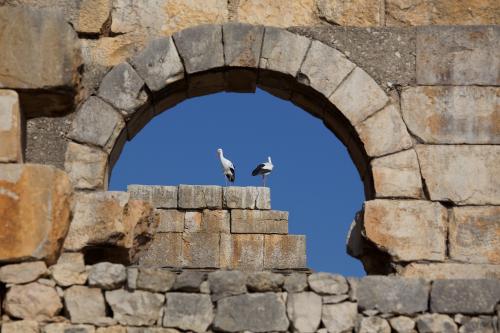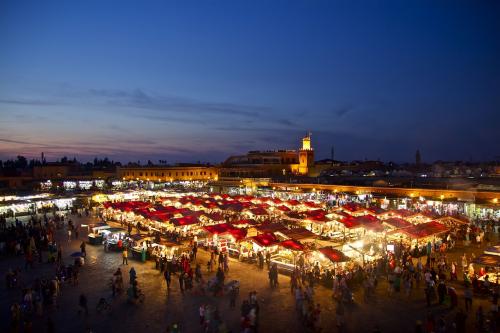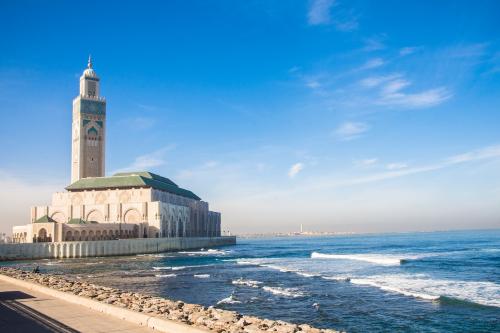Seasons in Morocco
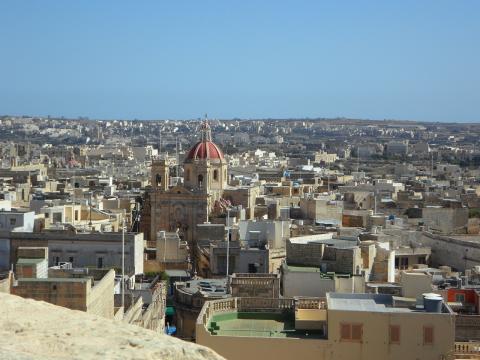
Morocco is former French colony located between Atlantic Ocean, Mediterranean Sea and Atlas mountains on north-west of Africa. Diversity of weather conditions of Morocco is undeniable and is the result of geographic features of the location. Weather is formed by cold Atlantic currents, impact of the Sahara desert and mountains. So specific weather is depending on certain location in Morocco.
Coastal areas have pronounced subtropical climate. Inland regions are in zone of continental weather conditions. Bigger part of the country has hot and dry summer with warm and humid winter. Yet in some regions have winter with negative temperature (below 32 °C, 90 °F).
Seasons
Contents:
March-May in Morocco
Spring is certainly not time for seaside vacations in Morocco. Ocean is cool at this time and weather is rather wet and cold. Until the very end of spring there are no chances for comfortable swimming cause temperature is about 19 °C (66 °F). But there are a lot of thing to do except swimming and sunbathing.
Sightseeing, cultural activities, numerous spa centers and last but not the least is gastronomical tourism. Moroccan food is one spectacular fusion of traditional Arabian dishes with haute cuisine approaches. April brings warming and by the beginning of May starts the season of blooming. This is spectacular time especially when orange trees join the celebration of awakening nature.
Climate from March to May
| March Max average t°: +20 °C (69 °F) Min average t°: +10 °C (49 °F) Water t°: +16 °C (61 °F) Sundial in the day: 9 hours Rainy days: 3 days Precipitation: 40 mm (1.6") |
| April Max average t°: +22 °C (71 °F) Min average t°: +11 °C (52 °F) Water t°: +17.5 °C (64 °F) Sundial in the day: 10 hours Rainy days: 3 days Precipitation: 32 mm (1.3") |
| May Max average t°: +23.5 °C (74 °F) Min average t°: +13 °C (56 °F) Water t°: +19.5 °C (67 °F) Sundial in the day: 11.5 hours Rainy days: 2 days Precipitation: 20 mm (0.8") |
(Rabat)
Holidays
March 3 – The anniversary of the ascension to the throne of King Hassan II.
May 1 – Labor Day.
May 23 – National holiday.
June-August in Morocco
At summer weather of Morocco is formed under influence of Azores anticyclone. It is hot and dry. Temperature at summer increases drastically except coastal areas to south from Casablanca. Cool Canary Current brings cool air and fogs.
Also summer is the midst of swimsuit season on the Atlantic coasts. But everyone who is about to go to Morocco for seaside vacations should regard that Atlantic Ocean warms slowly. One more feature is significant waves. This is advantage as much a disadvantage. Close to Mediterranean Sea waters are calmer. Best time to go is at July or August or even at the Velvet Season.
Climate from June to August
| June Max average t°: +26 °C (79 °F) Min average t°: +16 °C (61 °F) Water t°: +21 °C (70 °F) Sundial in the day: 13 hours Rainy days: 0 days Precipitation: 5 mm (0.2") |
| July Max average t°: +28 °C (82 °F) Min average t°: +18 °C (64 °F) Water t°: +22 °C (72 °F) Sundial in the day: 13 hours Rainy days: 0 days Precipitation: 1.4 mm (0.06") |
| August Max average t°: +28.5 °C (83 °F) Min average t°: +18.5 °C (65 °F) Water t°: +22.5 °C (73 °F) Sundial in the day: 12 hours Rainy days: 0 days Precipitation: 8.5 mm (0.3") |
(Rabat)
Holidays
July 30 – Enthronement.
August 14 – Oued Ed-Dahab Day.
August 20 – Revolution of the King and the People.
August 21 – Youth Day.
September-November in Morocco
Beginning of autumn may be as hot as summer especially in inland cities and towns. Coasts are more comfortable due to breezes. September is the Velvet Season but at October is cools down to point where swimming isn’t comfortable anymore. But there are still enough heated pools.
On the other hand such weather is great for other kinds of activities. Summer heat is gone so tourists are able to visit sights and dive into spectacular Moroccan culture. The country can offer numerous places of interest: main square of Marrakesh, ancient mosques of great architectural value and other attractions of mysterious culture of Middle East.
Climate from September to November
| September Max average t°: +27 °C (81 °F) Min average t°: +17 °C (63 °F) Water t°: +22 °C (72 °F) Sundial in the day: 11 hours Rainy days: 1 day Precipitation: 13 mm (0.5") |
| October Max average t°: +25 °C (78 °F) Min average t°: +14.5 °C (58 °F) Water t°: +21 °C (70 °F) Sundial in the day: 9.5 hours Rainy days: 1 day Precipitation: 26 mm (1.0") |
| November Max average t°: +21 °C (71 °F) Min average t°: +11 °C (53 °F) Water t°: +19.5 °C (67 °F) Sundial in the day: 8 hours Rainy days: 6 days Precipitation: 77 mm (3.0") |
(Rabat)
Holidays
November 6 – Green March.
November 18 – Independence Day.
December-February in Morocco
At in winter in Morocco prevail humid and cold sea air driven by cyclones from north and north-west. However cold periods are occasionally interrupting by eastern hot tropical air. For instance on the same spot in Casablanca at same date of different years was registered temperature of 36 °C (97 °F) and -3 °C (27 °F).
Humidity of winter occasionally causes fogs. Going in Morocco at winter on should keep in mind that fewer hotels have heating. More likely it will be in expensive ones. And addition you should pack some waterproof clothes in case of rains which may be rather frequent at this time of a year.
Climate from December to February
| December Max average t°: +18.5 °C (66 °F) Min average t°: +9 °C (48 °F) Water t°: +18 °C (64 °F) Sundial in the day: 8 hours Rainy days: 2 days Precipitation: 28 mm (1.1") |
| January Max average t°: +17.5 °C (63 °F) Min average t°: +8 °C (46 °F) Water t°: +17 °C (63 °F) Sundial in the day: 7.5 hours Rainy days: 4 days Precipitation: 46 mm (1.8") |
| February Max average t°: +18 °C (65 °F) Min average t°: +8 °C (47 °F) Water t°: +16 °C (61 °F) Sundial in the day: 8 hours Rainy days: 3 days Precipitation: 36 mm (1.4") |
(Rabat)
Holidays
January 1 – European New Year's Day.
January 11 – Proclamation of Independence.
Islamic Holidays in Morocco
Also there are several Islamic celebrations in Morocco. Their dates are assigned according to Islamic calendar which is different to Georgian so each annual Islamic celebration has variable date through each year in Georgian calendar. They will be counted below with names of months in Islamic calendar. Also celebration days in Islamic calendar begin after sunset and last to next dusk.
Muharram 1 – Islamic New Year.
Rabi' al-awwal 12 – Birth of the Prophet Muhammad.
Shawwal 1 – Eid ul-Fitr.
Dhu al-Hijjah 10 – Eid ul-Adha.
 Seasons of the Year
Seasons of the Year 